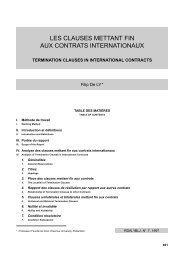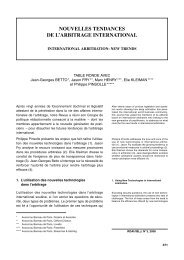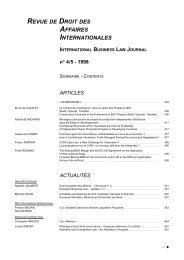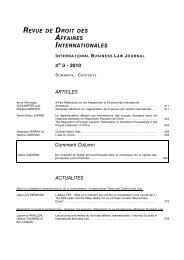ACTUALITES - Droit du commerce international et des affaires ...
ACTUALITES - Droit du commerce international et des affaires ...
ACTUALITES - Droit du commerce international et des affaires ...
You also want an ePaper? Increase the reach of your titles
YUMPU automatically turns print PDFs into web optimized ePapers that Google loves.
DROIT DU COMMERCE INTERNATIONAL ET DE LA CONCURRENCE50 per cent increase for ThyssenKrupp as a repeatoffender. However, this fine did not reach an amountas important as the one of Saint-Gobain Group.As far as Saint-Gobain is concerned, the groupconsidered that this fine—which would representapproximately 95 per cent of the annual turnover ofthe OEM activities (Original Equipment Manufacturer)of Saint-Gobain Vitrage automobile in Europe andabout 10 years of its n<strong>et</strong> profit—was “excessive anddisproportionate”. The group brought an appealbefore the Court of First Instance (CFI).dernière, l’amende tenait également compte de la taille<strong>des</strong> marchés, de la <strong>du</strong>rée (supérieure à huit ans) <strong>et</strong> dela majoration de 50 pour cent concernant ThyssenKrupppour récidive. Toutefois, c<strong>et</strong>te amende n’avait pas atteint unmontant aussi important que celui <strong>du</strong> groupe Saint-Gobain.Pour sa part, le groupe Saint Gobain a estimé que c<strong>et</strong>teamende qui représenterait environ 95 pour cent <strong>du</strong> chiffred’<strong>affaires</strong> annuel de l’activité OEM (Original EquipmentManufacturer) de Saint-Gobain Vitrage automobile enEurope, <strong>et</strong> plusieurs dizaines d’années de son résultatn<strong>et</strong> était « excessive <strong>et</strong> disproportionnée ». Le groupe adéclaré engager un recours devant le Tribunal de PremièreInstance (TPI).LNUNILATERAL BEHAVIOUR: E.ON SUBMITS FIRST-TIME COMMITMENTSPRATIQUE UNILATERALES : E.ON SOUMET DESENGAGEMENTS SANS PRECEDENTLNBy a decision dated November 26, 2008, the EuropeanCommission gave enforceability to the commitmentsoffered by the German group E.ON to remedythe various concerns raised by an investigation intro<strong>du</strong>cedpursuant to Art 82 of the Treaty in 2006. TheCommissioner Nelly Kroes declared:“For the first time in European antitrust history,a company is divesting very significant ass<strong>et</strong>sto address comp<strong>et</strong>ition concerns. More than20% of generation capacity will be available forcomp<strong>et</strong>itors and newcomers and should have apositive impact on electricity prices to the directbenefit of consumers”.Par décision <strong>du</strong> 26 novembre 2008, 5 la Commission a ren<strong>du</strong>juridiquement contraignants les engagements soumis parle groupe allemand E.ON pour remédier aux problèmesidentifiés au cours d’une enquête initiée en 2006 au titrede l’article 82 CE. La commissaire Nelly Kroes a déclaré :« Pour la première fois dans l’histoire européenne dela concurrence, une entreprise cède un très grosvolume d’actifs pour pallier <strong>des</strong> problèmes deconcurrence. Plus de 20 % de la capacité de pro<strong>du</strong>ctionseront accessibles aux concurrents <strong>et</strong> aux nouveauxvenus, ce qui devrait avoir un eff<strong>et</strong> positif sur les prix del’électricité <strong>et</strong> profiter directement aux consommateurs ».At the end of its investigation, the Commission concludedthat E.ON may have re<strong>du</strong>ced pro<strong>du</strong>ction capacityon the German wholesale electricity mark<strong>et</strong> toraise prices. In addition, E.ON may have implementeda strategy <strong>des</strong>igned to d<strong>et</strong>er third parties from investingin electrical pro<strong>du</strong>ction. Furthermore, it may haveabused its dominant position as a transmission systemoperator on the secondary electricity balancingmark<strong>et</strong> (“last minute” energy allowing to maintain thepower frequency in the n<strong>et</strong>work) by favouring its ownsubsidiary and passing on the increased costs to thefinal customer while preventing other power pro<strong>du</strong>cersfrom selling balancing energy into the E. ON mark<strong>et</strong>s.A l’issue de son enquête, la Commission avait concluque E.ON aurait tout d’abord r<strong>et</strong>iré <strong>des</strong> capacités depro<strong>du</strong>ction sur le marché de gros de l’électricité pourpouvoir augmenter ses prix. E.ON aurait également misen œuvre une stratégie pour dissuader les tiers d’investirdans la pro<strong>du</strong>ction électrique. En outre, elle aurait abusé <strong>des</strong>a position dominante en tant que gestionnaire de réseaude transport sur le marché secondaire de l’équilibrageélectrique (énergie « de dernière minute » perm<strong>et</strong>tantde maintenir la fréquence <strong>du</strong> courant sur le réseau) enfavorisant sa propre filiale, en répercutant les coûts accrussur le consommateur <strong>et</strong> empêchant d’autres pro<strong>du</strong>cteursd’électricité de vendre de l’énergie d’équilibrage sur sespropres marchés.202 © 2009 Thomson Reuters (Legal) Limited and Contributors









